ASK! Anthropology Mentors

Anthropology Skills and Knowledge Mentorship Program
Anthropology Skills and Knowledge (ASK) is a mentorship program where graduate students volunteer their time to answer questions that undergraduate students may have about anthropology.
ASK offers undergraduate students the opportunity to learn more about anthropology and its sub-disciplines.
This is a great opportunity to get involved in anthropology and explore if this is a career-path you would like to pursue.
Our mission is to help undergraduate students achieve their academic goals by sharing our own experiences and providing an informal discussion forum where undergraduates can connect with graduate students and faculty members.
In addition to learning about opportunities in the anthropology program at McMaster, members of ASK can also help with:
- Preparing a CV
- Getting letters of reference
- How to apply for graduate studies
- Volunteering
- Jobs in anthropology
- External grants (OGS, SSHRC)
- Publishing
- Scholarships
- Independent studies
- Internships
- Research opportunities
- Conferences
Information Box Group
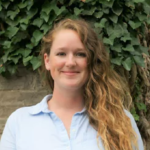
Shalen Prado (She/Her) Contact Shalen
Shalen is a second year PhD student studying Archaeology and Paleoethnobotany in the Anthropology Department at Mac.
Her research interests and expertise include: Landscape Archaeology, Paleothnobotany, Coastal & Maritime Archaeology, and Archaeological Methods; specifically applied to Iron Age & Medieval Europe (particularly North Western Europe). Shalen has done fieldwork in: Prince Edward Island (Historic and Indigenous), Nova Scotia (Historic), Ontario (Cultural Resource Management), and Scotland. Archaeological work has involved landscape surveys, excavation, report writing, collections management, and museum exhibit curation.
If you are interested in any of the above categories, please contact her at prados@mcmaster.ca. Shalen would also be happy to discuss finding archaeological fieldwork opportunities, applying to graduate schools (British & North American, distance learning and on campus), navigating graduate school, publications, and archaeological societies.
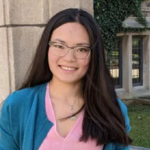
Beatrice Fletcher (She/Her) Contact Beatrice
Beatrice is a 4th year PhD student whose research focuses on the archaeological soil chemistry of Indigenous landscapes in Southern Ontario. Her fieldwork focuses on minimally invasive approaches, employing coring and augering to assess stratigraphy and soil composition. In the laboratory, Beatrice conducts x-ray fluorescence core scanning and micromorphology analyzes.
Beatrice has undertaken fieldwork in Ontario (prehistoric and proto-historic), Quebec (prehistoric), Oregon (prehistoric), and Greece (prehistoric). In addition to her fieldwork, she has also worked with material from the UK (prehistoric and historic) and British Columbia (prehistoric). Beatrice has also been involved in collections management and curation work in Southern Ontario and has undertaken exchanges in England.
Outside of archaeology, Beatrice likes to spend her time rock climbing and camping throughout Ontario. Beatrice would be happy to chat about fieldwork, lab-based research, collections based research, applying to graduate school and professional programs, applying for SSHRC and other graduate grants/scholarships, and conferences/publications.
You can contact her at fletchba@mcmaster.ca. Main Research Interests: North American Archaeology, Hunter-Gatherers, Geoarchaeology, Landscape Archaeology, Soils, X-Ray Fluorescence
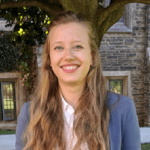
Akacia Propst (She/Her) Contact Akacia
Akacia is a 3rd year PhD student specializing in bioarchaeology. Her research focuses on applying research frameworks informed by syndemic theory to examine the interrelationships between multiple lines of skeletal evidence – dietary stable isotope data, paleopathological data, and age-at-death data – in a late medieval skeletal sample from Osor, Croatia using multivariate analyses as a way to discern intra-population variation, the processes driving any variation, and their socio-historical implications to see if this allows us to better understand past peoples’ lived experience.
Her other research interests include paleoepidemiology, theory in bioarchaeology, research methodology practices, and Roman frontier studies. She has excavated in the United States (historic and pre-historic), Canada (pre-historic), and Jordan. She has additional experience working as a Field Technician for CRM firms in the United States. Outside graduate school, Akacia likes to hike, forage, knit, and pursue other crafty undertakings.
She is happy to talk about field work, general interest in graduate school, applying for graduate school, navigating graduate school, lab and field research, and conferences. All questions are welcome!
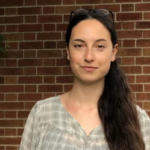
Duygu Ertemin (She/Her) Contact Duygu
Duygu is a first year PhD student whose research focus is on pottery production and organization in Prehistoric Anatolia (Turkey). Her research uses archaeometric techniques for qualitative and quantitative analyses such as petrography and scanning electron microscopy with energy dispersive X-ray spectroscopy (SEM/EDX). She completed her B.A in Archaeology at Bilkent University in Turkey, and her M.Sc. in Cultural Heritage Materials and Technologies at the University of Peloponnese in Greece.
She has been involved with prehistoric excavation projects in Turkey and also the CRM industry in Ontario, Canada. She worked in the Catalhoyuk (7100-5700 BC) Excavation and Research Project led by Professor Ian Hodder for several years along with Kanl?ta? Höyük (6000 BC) Excavation Project led by Professor Ali Umut Türkcan. Her academic interests lie in the fields of Anatolian prehistory, contextual archaeology, craft production and organization, archaeometric techniques used in cultural material analysis, along with archaeological field excavation and recording techniques.
Duygu would be happy to talk about finding field work opportunities, CRM industry in Ontario, archaeometric techniques, applying to graduate schools, grants, and conferences. She could also help with CV preparation and how to ask for reference letters.
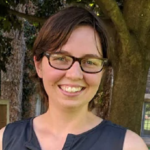
Dana Thacher (She/Her) Contact Dana
Dana is a 3rd year PhD student specializing in archaeology. Her research utilizes a large dataset derived from burial, monument inscription, baptism, and census records to explore differential commemoration rates of children in 18th- and 19th-century Cambridgeshire, England.
Her previous projects include Inuit use of material abandoned by the Franklin Expedition in Nunavut, Canada and combining statistical methods and visualization techniques in ArcGIS and QGIS to examine the intrasite spatial segregation of Paleo-Inuit lithic material. She has worked in a lithics laboratory, conducted fieldwork in England, and been involved in CRM in Ontario.
Outside graduate studies, Dana enjoys badminton, video games, and board games. She would be happy to talk about applying to graduate school, finding a graduate supervisor, applying for SSHRC and other funding opportunities, constructing a CV, working in CRM, and navigating graduate school more broadly. If you would like to chat with Dana, please email her.
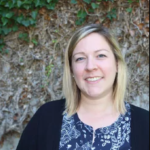
Marie-Hélène B.-Hardy (She/Her) Contact Marie-Hélène
Marie-Hélène is a 3rd year PhD student specializing in paleogenetics. Her research focuses on the evolution of infectious pathogens in North America between the 17th and the 19th century. Using ancient DNA analyses she identifies the pathogens present in ancient human remains to get a better portrait of how pathogens travelled through space and how they were able to do so.
She is interested in paleoepidemiology, patterns of migration, contact, ancient DNA and public health policies. Marie-Hélène did her Bachelor and Master degree in Université de Montréal, where she explored admixture between European colonizers and Indigenous populations in Nouvelle-France, through the use of dental morphology. She participated in field schools in urban historical archaeology (Montreal), forensic archaeology (Nova Scotia) and participated in a project for the restitution of prehistoric remains in Ontario.
She is happy to talk about the process of applying to graduate school, finding a graduate supervisor, getting recommendation letters, applying for SSHRC and other funding opportunities, lab work, volunteering opportunities for lab work during your undergraduate studies, and graduate school life in general. If you would like to chat with Marie-Hélène, please email her!
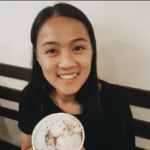
Julie Nguyen (She/Her) Contact Julie
Julie is a 1st year MA student specializing in biological anthropology. Her research broadly focuses on paleopathology and metabolic bone diseases. Specifically Julie’s research focuses on the skeletal analysis of rickets and scurvy in children and what these conditions can tell us about early life in Canada. She has excavated in Italy, and will be examining skeletal collections in Montreal, Canada.
Julie obtained her Bachelor of Science in Biology and Psychology and her Bachelor of Anthropology (Hons.) with a minor in sociology at the University of Alberta. Her Honours project focused on the creation of a histological faunal collection to assist the medical examiner’s office in identifying unknown osteological material. She has previous experience volunteering in a biomechanics lab looking at the effects of nerve regeneration and bone loading. Currently, Julie is working on a virtual ethnographic study with the department of pediatrics under the faculty of medicine at the University of Alberta examining Covid-19 effects and virtual teaching.
Julie’s other interests are forensic anthropology, dental anthropology, and public health. Julie is more than happy to chat about lab and field work opportunities, applying to graduate school, how to approach professors for references letters, conferences, applying for grants, what graduate school is like, and other questions you may have. You are more than welcome to email her.
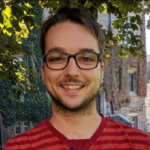
Éloi Bérubé (He/Him) Contact Éloi
Éloi is a 3rd year PhD candidate specialized in paleoethnobotany. He has worked in Québec, Chiapas, and Oaxaca. He has worked on projects in prehistoric, historical, and Early Colonial archaeology. He is currently working on the use of plants at the site of Monte Albán (Oaxaca, Mexico) in mortuary offerings and public ceremonies. His goal is to study how these plants allowed to maintain and strengthen a connection between the world of the living and the realm of the dead/spirits.
Éloi also obtained is MA diploma here at McMaster, working on Mixtec foodways before and after the arrival of the Spaniards at Achiutla (Oaxaca). He has done his undergraduate degree in Archaeology at l’Université Laval (Québec).
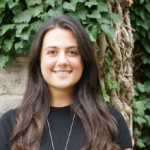
Loa Gordon (She/Her) Contact Loa
Loa is a 2nd year PhD student specializing in social and medical anthropology. Her research focuses on the clinical, community, and self-administered care tactics practiced by North American post-secondary students living with mental health struggles. In particular, she uses discourse analysis, interviewing, case study methodology, and “hanging out deeply” to understand how students, who are prone to distress during a challenging period in the life-course, manage their mental health when professional care is unavailable or inaccessible to them.
Her work blends academia with advocacy in a pursuit to address mental health inequalities on Canadian and American campuses. Loa also belongs to a World Health Organization college mental health initiative and has experience with international, interdisciplinary research that intersects psychiatry, epidemiology, and global health; improving communication and collaboration between the social and health sciences is one of her long-term goals.
Outside of her studies Loa enjoys hiking, painting, reading fantasy novels, and thrift shopping for neat finds. She would be glad to discuss grad school applications, asking for reference letters, finding a supervisor, anthropological societies, fieldwork, conferences, CV preparation, grant applications, and grad life in general. Please feel free to contact her.
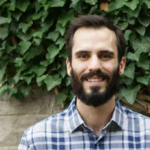
Julien Favreau Contact Julien
Julien Favreau is a second-year PhD Candidate in the Department of Anthropology at McMaster University. His research interests broadly include human evolution, stone tool technologies, and raw material sourcing to shed light on resource procurement, foraging ranges, and evolutionary ecology. As an undergraduate, Julien worked as an Archaeological Collections and GIS Assistant with Parks Canada. This afforded him the opportunity to participate in an obsidian sourcing project and map traditional place names in Nunavut’s Auyuittuq National Park. Julien has conducted fieldwork in Western Canada, Ireland, Zimbabwe, and Tanzania.
Julien has also conducted laboratory research in the Tropical Archaeology Lab (University of Calgary), the Geoscience Research Laboratory (University of Calgary), and the McMaster Archaeological XRF Lab (McMaster University) dealing with artifactual residues, phytoliths, starches, thin section petrography, and geochemistry. For his doctoral research, Julien is working in the McMaster Archaeological XRF Lab where he studies X-ray spectroscopic data from geological specimens and stone tools originating from northern Tanzania.
More specifically, he will seek to determine from which outcrops Pleistocene hominins at Oldupai Gorge obtained rocks to manufacture stone tools. These data may come to reveal spatio-temporal patterns among raw materials, stone technologies, and hominin species as well as contribute to our understanding of the origins of resource extraction. Julien would be happy to chat about any and all aspects of archaeology ranging from fieldwork to the publication process, as well as long-term planning for the acquisition of skills and experiences that can help undergraduate students fulfil their professional and academic goals.
